- Home
- Julie Smith
Louisiana Bigshot Page 2
Louisiana Bigshot Read online
Page 2
And now a little thing like a missed stop sign was about to ruin it all. One minute Talba was barreling toward truth and justice; the next, a force from hell struck with a sound like a gunshot, leaving her humiliated and hurting. For a moment she thought maybe it was a gunshot; she wouldn’t put it past the lying, low-down sack of manure she was following.
But, no, it was a Ford Explorer—a car about twice the size of Talba’s Camry—which had been lawfully moving through the intersection. She hadn’t seen the car or the stop sign. A crowd was beginning to gather. A siren wailed in the distance. And Talba’s back was killing her.
In her current state, she really couldn’t go back to the office and deal with Eddie about this thing. He could be slightly more of a pain in the patootie than Miz Clara herself.
There was only one good thing about this—that it wasn’t Eddie’s car that got wrecked. And not just because his was really his wife Audrey’s Cadillac. It was handsomely appointed with the Global Positioning System that Talba had bought half-price from some fly-by-night spy shop having a fire sale. She had a weakness for shopping at spy shops; her idea was, with the GPS Eddie could track her if she got in a tight spot. But after spending a week’s salary on it, she realized he didn’t even have a laptop for the tracking system. So, under great protest, she’d made him let her install it in his own car.
Under very great protest. Eddie claimed the Twenty-First-Century PI needed only six pieces of equipment, one of which was a child’s toy and only two of which were electronic—cell phone, tape recorder, video camera, conventional camera, binoculars, and Tee-ball bat. The last was the closest thing to a weapon he ever carried. “It’s well-balanced, with a good grip, and heavy enough to do some damage. And it’s absolutely legal,” he told Talba when he presented her with hers.
Groaning, she retrieved it now, along with her maps and the other five items. She put the entire PI kit in a Guatemalan bag she had in the trunk, thinking that where it really belonged was in a new car. But she sure couldn’t shop for one bent over like she was.
So she called Babalu Maya for an appointment and got the tow truck to drop her at Whole Foods on its way to Camry heaven. Babalu, bodyworker extraordinaire (whose real name was probably Barbara), lived within spitting distance of the only store in New Orleans where you could buy a head of lettuce for the cost of a new Camry. Talba could walk the block and a half if she didn’t collapse first; she could hobble it, anyhow. Or so she thought. She found the effort made her nauseous.
“Girl!” Babalu’s face said Talba’s pain was her pain. “I swear to God you’re pale.”
Babalu was white; she said things like that. Talba was not merely African-American but black. Good and black, thank you very much. She knew she was nowhere near pale, but she couldn’t be looking her best.
“Give me that bag and sit down. Just sit down, now.” Talba still had stairs to climb. Babalu exerted pressure on her shoulders; Talba yielded. And before she knew it Babalu had done something, she hadn’t a clue what, that made it possible to straighten up.
“Can you make it upstairs?”
Talba nodded gratefully and hobbled up ahead of Babalu, who evidently thought she might have to catch her if things didn’t go well. Talba knew the drill so well she didn’t even pause, just went into the first room off the hallway, removed her shoes and earrings, and slid gingerly onto the massage table.
Babalu said, “Tell me about it.”
“Well, I didn’t see the stop sign. This tank or something hit me on the shotgun side—caved in my whole front end.”
“You are one lucky female.” Babalu’s pretty face screwed itself up. She had short blond hair that she wore in a careless, shaggy bob, clear, satiny skin, and some kind of chain tattoo crawling up her arm—Celtic knots, she said, but it gave Talba the creeps. Like some kind of metaphorical half-handcuffs. Babalu had smiled the time she mentioned it—and not a nice smile, either; as if the effect was deliberate.
Talba said, “Lucky. How come I can’t quite see it that way? I’m pretty sure my car’s a total.”
“Oh, I’m so sorry. Wish I had one to lend you.” That was the way she was, Talba thought. A nurturer; a healer. She knew Talba only as a client, and yet she behaved like a friend.
Talba groaned again and changed the subject, hoping for distraction from the intermittent pain. “Okay, enough about me. What’s new with you?” She arched her back against Babalu’s fingers.
“You haven’t been here in too long, or you’d know. Feel that? These muscles think they’re bone. A little stress, I’d say.”
Talba ignored the last part. “Or I’d know what?”
Babalu waved her left hand provocatively; its fourth finger glinted. “I’m getting married.”
Talba tried to sit up, just to take in the news. Babalu leaned over her chest and pushed her down. Tough. But her cheeks were flushed and she was smiling. Talba gave up. “Hey, that’s fantastic!”
“Yeah. I’m pretty happy.” The blush deepened.
“Well, tell me everything.” This was good. There was nothing so distracting as a little romance.
“He’s… cute.”
“Yes? And?”
“Well, he’s from Mississippi, and his name is Jason. He’s about six feet tall with dark, gorgeous hair…”
“Umm hmm. Blue eyes, I bet.”
“Yeah. How’d you know?”
“You like that. I remember.” A bodyworker, she reflected, was like a hairdresser or an exercise partner. There you were for an hour, just the two of you—of course you were going to talk about who you were dating. “He’s probably an actor.”
Babalu nodded. “Pretty good, too.”
“I knew it. You’re such a stage-door Jenny.”
“I like people with talent—the way I grew up was just so… I don’t know…”
“Stuffy?”
“What makes you think that?”
“You’ve got that deb look. Except for the tattoo, of course. And the zany hair.”
Babalu laughed. “Carefully cultivated. We were trailer-trash, actually.”
“Back to the guy. Does he have a day gig?”
“He’s… ummm… a stock trader.”
“A trader? With the market in the toilet?”
Babalu shrugged. “He seems to do okay at it.”
“That’s a fair-sized rock he gave you, anyhow.” She realized Babalu hadn’t said one really personal thing about the man. “What about him really, though? What’s your favorite thing about him?”
“My favorite thing?” The question seemed to catch her offguard, but she recovered quickly. “You think I’m going to talk about that?”
“Don’t. Ow. It hurts to laugh. Also, you’re mashing a tender spot.”
Instantly, Babalu’s fingers lightened up. Talba sought once more to distract herself. “Okay, what do you like least about him?”
“Least?”
“Yeah, least. I know you’re crazy in love and all that but search your conscience—there’s got to be something.”
Talba could have sworn Babalu’s hands tightened on her back—even pinched a bit. She heard a sound like a sniff. Damn! She sure didn’t want to get a cold.
But it wasn’t that. The sniff was followed by a sound like snurf, a smothered sound, but there was no mistaking it; Babalu was crying.
“What is it?” Once again, she tried to rise, thinking to hug the healer, but Babalu held her down.
“No. Let’s finish the session.”
Talba didn’t move, but she wasn’t about to keep quiet. “Girlfriend, what is it?”
“I think he’s cheating on me.”
Oh, boy. Talba had heard plenty of this kind of thing lately. Louisiana might have no-fault divorce, but there was still the issue of spousal support, which was why she was surveilling a low-down scumbag cheater when the Explorer slammed her. Proof of catting around could pay off handsomely, but that was irrelevant in Babalu’s case. What was relevant was, the marriage was of
f to a rocky start and it hadn’t even happened yet.
“You can’t marry an asshole who’s cheating on you. Babalu, hear me—you do not deserve this. Give the man his ring back.”
“You’re scrunching up again.”
“You’re getting me upset.”
“Well, I just said he may be. He’s probably not. Maybe he’s… I don’t know—maybe it’s something else.”
“Talk to me. Tell me about it.”
“I can’t. You’re scrunching up. You want to walk out of here or not?”
Talba tried to relax.
“You know what I need? I need a detective.”
“No, you don’t. You need out.”
“Could you relax, please? Look, can I come to your office tomorrow? Talk to you about it?”
She sounded so pitiful Talba said okay, maybe they could trade services. But she never thought Babalu’d show up.
Chapter Two
Babalu was there at nine a.m. sharp, which was more than Talba could say for herself. Because of her mishap of the day before, she’d had to take the 82 Desire, and you never knew with buses. She didn’t get there till 9:20 and she knew from experience that Babalu’s first appointment was at ten. “You’re serious about this.”
“How’s your back?”
“Much better. How’re you?” Talba asked the question gingerly, not wanting it to sound like an accusation.
Babalu’s honey-blond hair needed washing; it more or less stuck up in spikes. The circles under her eyes were so pronounced it occurred to Talba she was doing drugs. But Babalu was the cleanest liver she knew—drank green tea instead of coffee, and nobody in New Orleans did that. “He stood me up again. I’ve got to know, Talba. I can’t sleep or anything.”
“I can believe that. Sorry we don’t have any green tea.”
“Coffee’s okay today.”
“You’re going to need it. By the way, do you have a ten o’clock?”
Babalu nodded.
“We won’t be out of here by then. We have this instrument of torture Eddie invented to scare away customers, called the intake interview. If you can survive it, you might as well marry the guy, because that proves you can handle anything.”
It was supposed to elicit a smile, but Babalu wasn’t in the mood. She whipped out her cell phone, canceled the appointment, took off the vintage jacket so nicely complementing her jeans, and sat down. Talba got the feeling she wasn’t in the best of tempers.
“Sure you want to go through with this? It gets pretty ugly.”
“I’ve got to do it, Talba.”
Talba felt for her, though if the man in question were her own sweetie, Darryl Boucree, she thought perhaps a hit man might be more to the point than a detective. She began the tedious procedure of invading every single corner of Babalu’s and Jason’s privacy.
The first part was just like girlfriend talk. “How did you two meet?”
“At a poetry reading.”
They laughed. Babalu and Talba had met the same way. Both were poets, as a matter of fact, in their nonworking lives.
“Is he a poet?”
“Well, he thought he was. Before people started throwing things at him.”
“Oh. How’d he take it?”
“He kind of laughed. He was just trying it on for size. As I said, his art really is acting. But he loves it that I’m a poet.”
Babalu’s poems were full of metaphors about the body—about muscles and bones and joints. They were quite beautiful, Talba thought. Her own were much earthier, more inclined to narrative.
“Have you met his family?”
“Oh, yes. They’re from Canton, just outside of Jackson. His daddy’s a high-powered lawyer or something.” She giggled. “I had to wear long sleeves so they wouldn’t see the tattoo.”
Talba raised an eyebrow. “Your idea or his?”
“Oh, mine. He seems to be the black sheep. I mean, they kept asking him questions about when he was going to get a job.”
As well they might, Talba thought. “What did he say to that?”
“He said he had a job—investing.”
“I thought you said he traded.”
She flushed in embarrassment. “I guess he didn’t want to admit that.”
Talba felt frustrated. “What’s he investing? He’s a young guy, no job…”
“Well, that came out at the time. His mom said he was ‘gonna run through all granddaddy’s money’ before his first child was even born.” She shrugged. “I guess he has some kind of inheritance.”
“How’d that make you feel? Talking like that in front of you?”
“Actually, they were pretty nice. I think they liked me.” Again, Talba raised an eyebrow; this time she left it raised and gave Babalu a stare like a snake about to strike.
Babalu gave her back a smug-cat look. “I practically wore a circle pin. I was raised in a small town too, you know.”
“Girlfriend, you got more problems than the tattoo and the hair. What on earth did they make of that name of yours?”
“You mean Bobbie Lou? We didn’t even have to lie—they just heard it that way.” Talba and Babalu got to share a laugh, a good thing, considering the grimness of the circumstances.
And then it was on to the boring stuff, followed by the nasty stuff.
Where did Jason live? What vehicles did he have? Ever married before? Any children? Who were his friends? What was his schedule? How about his physical description, phone numbers, hobbies, interests, habits? Did he smoke, drink or do drugs?
Well, what did he like? Was he left-handed or right-handed?
Had he ever been violent? Was he a fast driver? (This was to plan the surveillance.)
Then, there was Babalu. Who were her friends and relatives and what did they look like? (There had been cases of husbands buying lingerie with gorgeous blondes who turned out to be the wife’s best friend helping him shop for her birthday.)
Talba personally knew of one—Eddie had carefully videotaped the whole thing and ruined the surprise party.
What was their sex life like? This was Talba’s least favorite question, but she had to admit, it was usually productive. Babalu pulled at a chipped bit of black nail polish. “Well, that’s one of the things that’s got me worried. He’s kind of… lost interest.”
Now, that was unusual. Usually, if there was a paramour, frequency increased; sometimes the misbehaver even got more inventive.
But this was an engagement, not a marriage. Talba could think of cases in her own life in which the relationship simply cooled on one or both parts. She figured that was probably what was happening here. It was all she could do not to reiterate that Babalu absolutely must not, should not, could not marry this man—he was wrong, wrong, and wrong. But what the hell—pretty soon she was going to have pictures.
“Is that why you think he’s cheating on you?”
Babalu grabbed hunks of her dirty hair and pulled on it. “He just doesn’t seem interested anymore. I think he’s trying to break up with me.”
“Why not just ask him?”
She was quiet, thinking a long time before she spoke. “I don’t know if I could handle the answer.”
“What makes you think—”
Babalu held up a hand. “Stop. I know what you’re thinking. I need to do it this way. I want to know everything. I want to know and have him not know I know. I need to buy myself time to think about what to do.”
“What to do! I’ll tell you what to do.”
Babalu’s eyes misted over. “Talba, please.”
Talba eased up. The healer, the talented poet she held in such esteem, was really much more fragile than Talba liked to believe. She remembered something Babalu had once told her about her name—Maya meant peace or something, but Babalu was an Afro-Caribbean god or saint, always depicted with a crutch. “It’s the archetype of the wounded healer,” she said.
Talba hadn’t pressed it, taking it at the time for some kind of general metaphor, something about every
one being wounded. But it occurred to her now that this woman, so strong on the outside, had internal wounds so severe she didn’t even have the self-esteem to get rid of a scrofulous piece of shit who was cheating on her. Well, fine. Talba could help with that. And not by nagging either. It would be her pleasure to shoot a home movie that would stand up in court. Not that that was needed—she just liked to do things right.
The second Babalu left, Talba sat down to do what she always did after an interview, and found she hadn’t done the first thing right. Eddie had taught her two primary rules of doing business—first cash the check; second, run a background check on the client. Babalu had paid her retainer in cash (not surprising—she liked her own clients to pay cash), so the first wasn’t necessary. However, due to that oddity, Talba had no way of knowing what her client’s legal name was; and it hadn’t occurred to her to ask. In fact the whole background routine had slipped her mind, and now that she thought about it she found it creepy. Maybe you made an exception when you knew the client. Certainly her subconscious had.
But something nagged at her. Did she really know Babalu?
She knew Babalu wasn’t a charlatan. Maybe that was enough.
She busied herself backgrounding Jason instead, an eminently boring task, since everything checked out down to a very decent credit record. (This was something PI’s weren’t entitled to, but Talba knew how to get it and on this occasion, since a friend was involved, she went for it.) Granddaddy must have done well by him, she thought. That part boded well for Babalu; it was something to cling to.
Next on the agenda was a recon of the surveillance area, and it was nearly time for lunch. She could get some fresh air and do the recon at the same time—right after she rented a car.
Jason lived in the area of town referred to as the Lower Garden District, not to be even slightly confused with the Garden District proper, which was very proper indeed. The lower version was hip, upwardly mobile, mixed in just about every way, and a little dicey—actually a by-the-numbers neighborhood for an unemployed actor. It offered good deals if you didn’t mind watching your back.

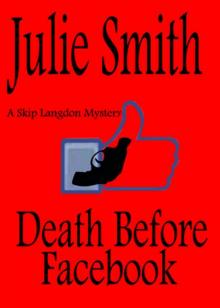 Death Before Facebook (Skip Langdon #4) (Skip Langdon Mystery) (The Skip Langdon Series)
Death Before Facebook (Skip Langdon #4) (Skip Langdon Mystery) (The Skip Langdon Series) P.I. On A Hot Tin Roof
P.I. On A Hot Tin Roof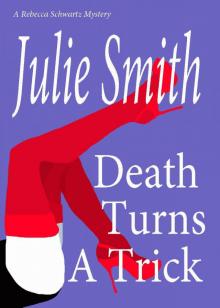 Death Turns A Trick (Rebecca Schwartz #1) (A Rebecca Schwartz Mystery) (The Rebecca Schwartz Series)
Death Turns A Trick (Rebecca Schwartz #1) (A Rebecca Schwartz Mystery) (The Rebecca Schwartz Series) The Axeman's Jazz (Skip Langdon Mystery Series #2) (The Skip Langdon Series)
The Axeman's Jazz (Skip Langdon Mystery Series #2) (The Skip Langdon Series) The Kindness of Strangers (Skip Langdon Mystery #6) (The Skip Langdon Series)
The Kindness of Strangers (Skip Langdon Mystery #6) (The Skip Langdon Series) Louisiana Hotshot
Louisiana Hotshot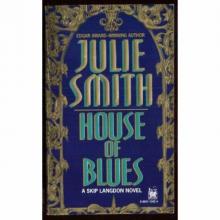 House of Blues
House of Blues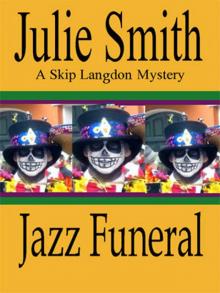 Jazz Funeral (Skip Langdon #3) (Skip Langdon Mystery) (The Skip Langdon Series)
Jazz Funeral (Skip Langdon #3) (Skip Langdon Mystery) (The Skip Langdon Series) Tourist Trap (Rebecca Schwartz #3) (A Rebecca Schwartz Mystery) (The Rebecca Schwartz Series)
Tourist Trap (Rebecca Schwartz #3) (A Rebecca Schwartz Mystery) (The Rebecca Schwartz Series)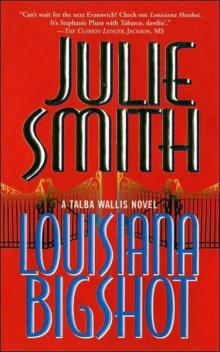 Louisiana Bigshot
Louisiana Bigshot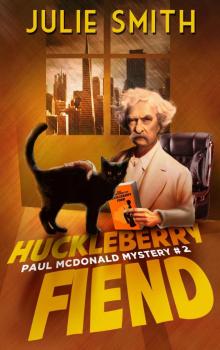 Huckleberry Fiend
Huckleberry Fiend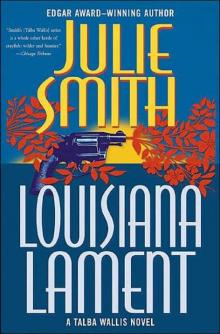 Louisiana Lament
Louisiana Lament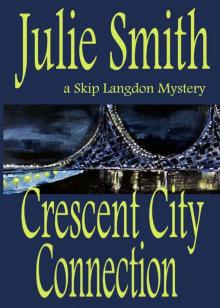 Crescent City Connection (Skip Langdon Mystery #7) (The Skip Langdon Series)
Crescent City Connection (Skip Langdon Mystery #7) (The Skip Langdon Series)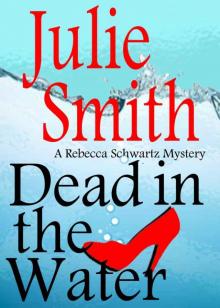 Dead In The Water (Rebecca Schwartz Mystery #4) (The Rebecca Schwartz Series)
Dead In The Water (Rebecca Schwartz Mystery #4) (The Rebecca Schwartz Series)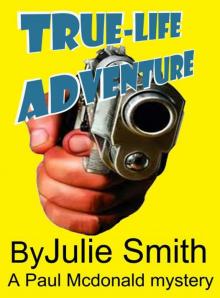 True-Life Adventure
True-Life Adventure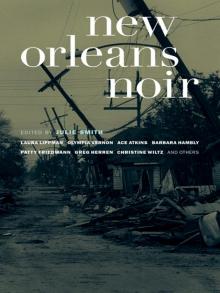 New Orleans Noir
New Orleans Noir